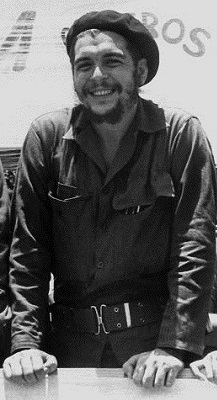|
~ Ernesto Che Guevara
~ Galéria
~ Oldal
~ Bejelentkezés
~ Vissza a Főoldalra
Ernesto Che Guevara, az argentin származású forradalmár, miniszter, gerillavezér és író, Buenos Aires-ben szerzett orvosi diplomát, majd a kubai forradalom során jelentős szerepet játszott a szigetország felszabadításában és újjáépítésében. A kubai gazdaság talpraállításáért dolgozott, küzdött az oktatás és az egészségügy fejlesztéséért, az írástudatlanság és a faji előítéletek felszámolásáért. Saját példájával népszerűsítette az önkéntes munkát. Kongóban és Bolíviában is harcolt - harminckilenc éves volt, amikor az amerikai-bolíviai csapatok csapdába ejtették és kivégezték.
| | |
|

| | |
|
|
|
Che Guevara és a horgászat
|
Üdv!
Ma ismét a Galéria tartalmát bővítettem: ezúttal olyan fotókat töltöttem fel (szám szerint tizenkettőt), amelyeken Che Guevara horgászat közben látható. Sajnos egy kicsit szegényesebb, mint a sakkozással kapcsolatos képtár.
Természetesen Che itt sem mondott le két nagy szenvedélyéről, az olvasásról és a fotózásról - amikor éppen nem beszélgetést folytatott valakivel.
A képek nagyobb része egy 1960. május 15-i havannai horgászkirándulásról való, amelyre az édesanyja, Celia de la Serna is elkísérte a fiát.
Itt megtekinthetitek a képeket: [Horgászat]
|
|
Today I have broadened the content of the Gallery again: this time I have uploaded such photos (twelve photos, to be precise) where Che Guevara can be seen fishing. Unfortunately this album is a little poorer, than the one about the chess.
Of course Che didn't give up two of his biggest passions, reading and taking photos - when he was not just having a conversation with someone.
The bigger part of the photos are from the fishing trip on 15th May 1960 in Havana, for which Che's mother, Celia de la Serna accompanied his son.
Here you can check out the photos: [Fishing]
|
|
|


| | |
|
|
|
~ Ernesto Che Guevara
~ Gallery
~ Site
~ Log in
~ Back to the Main page
Ernesto Che Guevara, the Argentine-born revolutionary, minister, guerrilla leader and writer, received his medical degree in Buenos Aires, then played an essential part in the Cuban Revolution in liberating and rebuilding the country. He did his best to set up the Cuban economy, fought for the improvement of the education and the health system, the elimination of illiteracy and racial prejudice. He promoted voluntary work by his own example. He fought in the Congo and in Bolivia - he was thirty-nine years old, when he was trapped and executed by the joint American-Bolivian forces.
| | |
|
|

